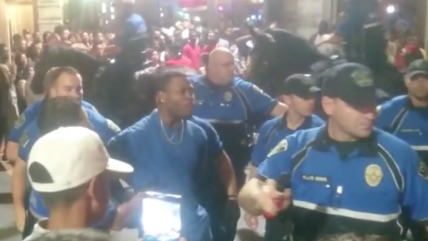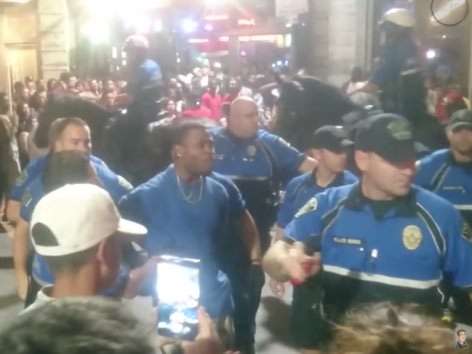Austin Police Grab Man's Cellphone, Then Pepper-Spray Him
Another bystander punished for filming police.


The Austin Police Department (APD) is "conducting a review" after a video surfaced showing a mounted officer snatching a man's phone and throwing it on the ground while another officer pepper-sprays him.
The Twitter user, who uploaded the video early Sunday morning, started recording because he saw "someone get tackled by a single police officer," according to the video's description on YouTube. Other officers, including some on horseback, try to separate the rowdy crowd from officers who appear to be making an arrest. Several bystanders can be seen in the video with cellphones in their outstretched arms recording the altercation.
The video shows one of the horseback officers grabbing the phone out of a bystander's hand. The man reaches up as if to ask for his phone back, the officer on horseback rides forward, and a cop on foot immediately pepper-sprays the man.
Contacted by email, the APD says the department is "aware of this incident and is conducting a review to determine if the officers' conduct is compliant with our policy."
In a phone interview with KXAN News, the Twitter user who uploaded the video (who asked to be identified as "Tucker") explained his reasoning for filming the encounter:
I might as well record it, because there's only two options: either nothing happens or something happens, and either way, it's no harm, no foul.
There's only good that can be gained from having more information readily available.
Tucker highlighted that filming police interactions is beneficial for all involved:
The police officers, for their own protection, so they feel safe in case the crowd does encroach upon their territory or their work, as well as in light of recent events in Baltimore and Ferguson, protecting the citizen who may just be there.
As Reason's Jacob Sullum notes:
There is no legal basis for such interference with camera-carrying bystanders. The right to record police has been explicitly upheld by at least four federal appeals courts—in the 1st, 7th, 9th, and 11th circuits—and implicitly recognized by others.
Federal judges outside of those four circuits have ruled that the right to record flows logically from the First Amendment right to gather information and that it applies equally to everyone, not just credentialed journalists. Big-city police chiefs take it for granted that "members of the public are legally allowed to record police interactions," as a 2014 NYPD memo put it, and that "a bystander has the same right to take photographs or make recordings as a member of the media," as Washington, D.C., Police Chief Cathy Lanier informed her officers in 2012.
On thing that's worth noting: Tucker only starts recording after the action starts. Reason's Ronald Bailey touched on this problem back in 2013.
People typically start recording only after an encounter turns aggressive, so the context of what is happening is lost.
He's right. If police were to wear body cameras, we might get a more complete picture of how these incidents start, and whom to hold responsible.
Watch the video here:


Show Comments (68)